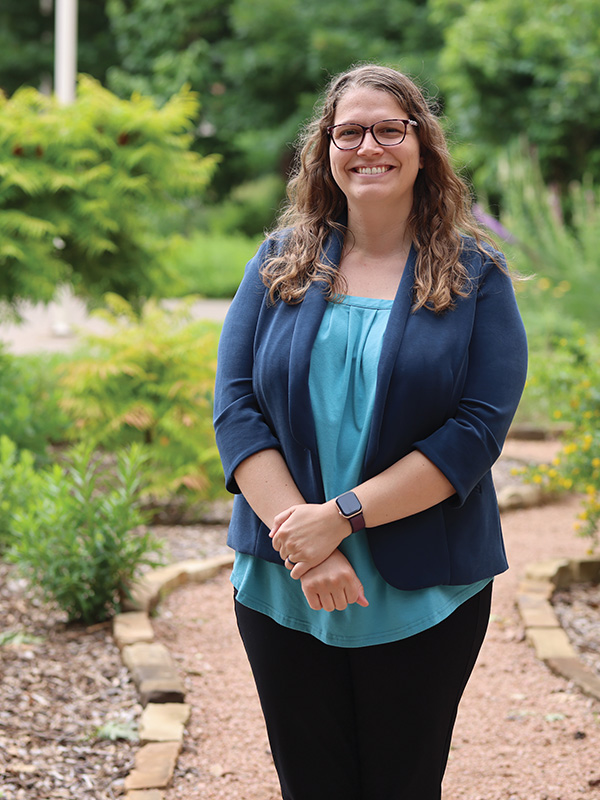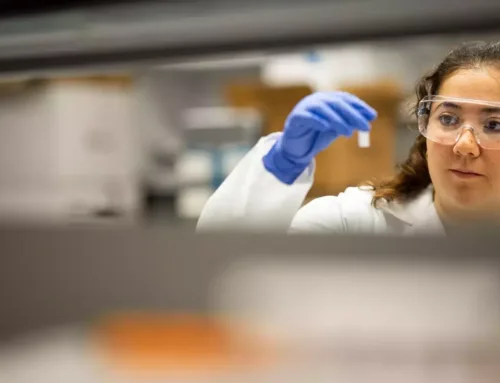Everything is Connected: Foltz’s research investigates interplay between farming practices
October 3, 2025
Media Contact:
Kristi Wheeler | Communications Coordinator | 405-744-5831 | kristi.wheeler@okstate.edu
Meeting the rising food challenges with a growing global population requires innovative
research.
This includes incorporating technology to improve crop yield and making agriculture
more resilient to climate change.
Dr. Mary Foltz, an assistant professor in the School of Civil and Environmental Engineering,
is passionate about sustainable agriculture and mentorship. This passion led to her
being named a National Science Foundation CAREER award recipient.
The CAREER award is a prestigious five-year grant of approximately $550,000 that will
support Foltz’s pursuit of a research project titled: “Cultivating Sustainable Agriculture
and Education through Transitions.”
“I was speechless when I found out I got the NSF CAREER Award,” Foltz said. “I had
spent a year working on my application alongside a good friend who was also applying
to the same program. She had found out she got hers shortly before, and we were both
so excited. We had really hoped one of us would get it, but when we found out we both
got it, we were in disbelief. ‘What are the odds?’ we thought. I am so grateful to
have had an accountability partner and experienced the ups and downs of this process
with a friend.”
Her research will investigate how farming practices affect the environment and the
resilience of crops in a changing climate.
Foltz structured this project into three main goals: to quantify and assess the environmental
impacts of farm management decisions under various conditions; to develop a user-friendly
tool for farmers to make more informed decisions; and to establish a statewide mentorship
network to connect and educate students during critical transitions.

practices affect the environment and how crops can be more resilient in a changing
climate.
“Overall, I hope that more folks will understand how important our decisions are in
influencing the environment — and the other way around,” Foltz said. “Everything is
connected, and the decisions we make today can have lasting impacts not just for our
generation, but for many to come.”
The project’s education and outreach aspect will include a statewide mentorship program.
Foltz and Dr. Jaime Schussler started a pilot program in 2024 for future water researchers
to be mentored by current water researchers. The program connects an Oklahoma high
school or undergraduate student with two mentors at different stages of their careers,
one intermediate and one more experienced.
Foltz included the word “transitions” in the title of the proposal due to a deep personal
connection based on her experience with neurodivergence. Transitions, such as from
high school to college or from college to the workforce, are a challenge for anyone,
but particularly for people who are neurodivergent. This gave Foltz the idea of adding
to the program by involving mentorship for students experiencing a transition. The
mentorship program will aid students as they navigate them.
“Students are matched with someone who has recently gone through that transition (the
intermediate mentor) and a more senior mentor (like a faculty member or Ph.D. student),”
Foltz said. “Together, they can help navigate these challenging times with the support
they need to succeed.”
Her research holds true to the land-grant mission of teaching, research and extension.
By focusing on improving the farming capabilities of Oklahoma’s farmers, the state
will be more prepared to meet any transitions due to climate change.
“This award provides support and stability for my team to continue our work in sustainable
agriculture for the next five years,” Foltz said. “It also sets us up to be experts
in this field, which has always been a personal goal.”
But Foltz remembers that this research is about helping the people of Oklahoma and
beyond.
“This is something farmers deeply care about because they want to make sure their
farm remains productive for their children and grandchildren,” she said.
Photo: Tanner Holubar
Story by: Tanner Holubar| IMPACT Magazine
Search
RECENT PRESS RELEASES
Related Post



